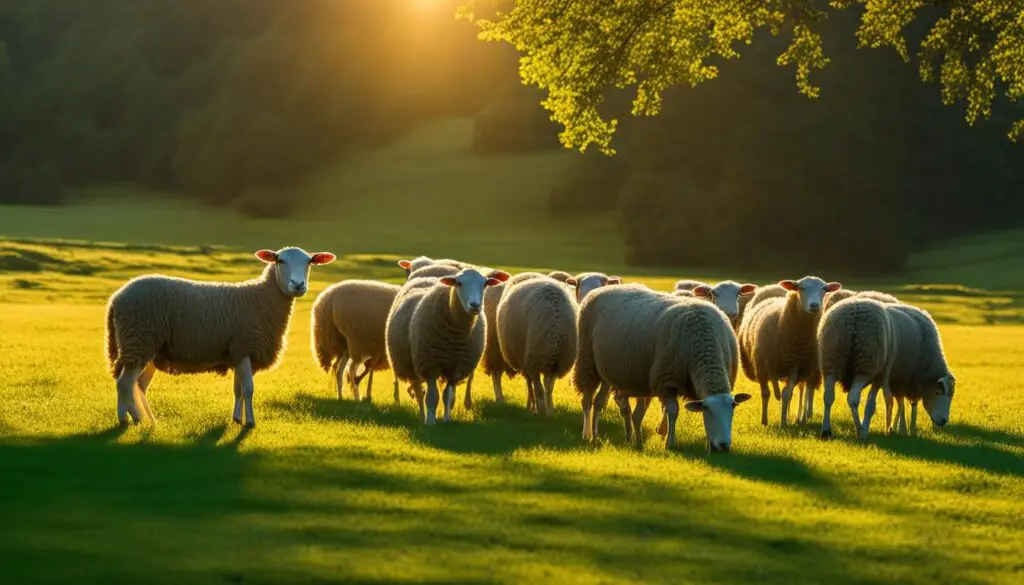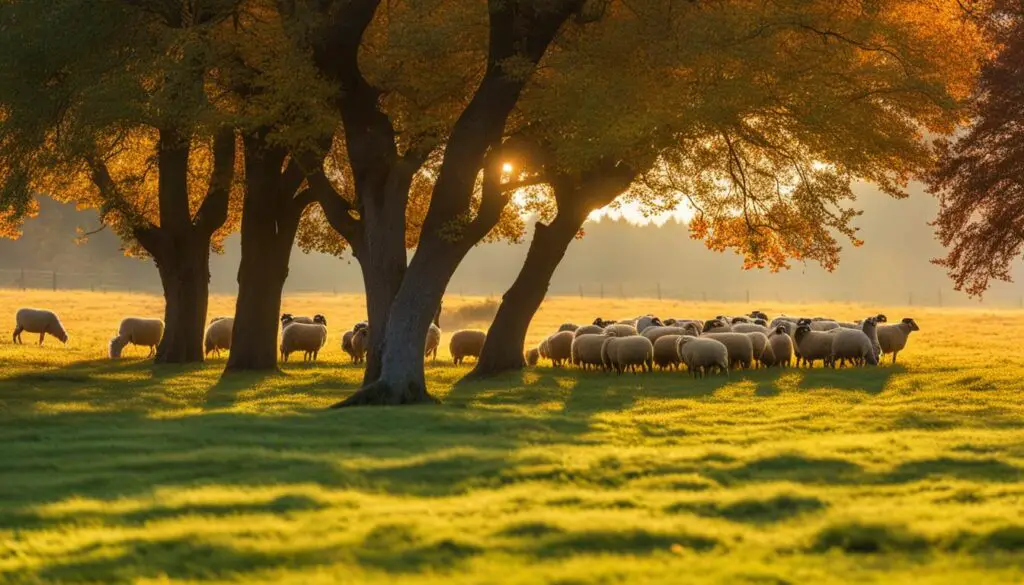Sheep are ruminant animals that require a diet rich in fiber and nutrients to maintain optimal health and productivity. Feeding sheep the right food is crucial for their overall wellbeing, and this comprehensive guide will provide insights into what sheep can eat and how their diet affects them.
Whether you are a sheep farmer or simply an animal lover, understanding the dietary needs of sheep can help you ensure that these gentle creatures lead a healthy and happy life. So, let’s explore what sheep can eat and how to provide them with a balanced diet.
Key Takeaways
- Sheep require a balanced diet to meet their nutritional requirements.
- Their diet should contain proteins, carbohydrates, fats, vitamins, and minerals in appropriate quantities.
- Grazing on quality pasture is a natural and beneficial part of a sheep’s diet.
- There are a variety of safe and suitable foods for sheep, including grasses, legumes, and forage crops.
- Understanding what sheep prefer to eat can help optimize their diet and support their health.
Essential Nutrients for Sheep
Sheep, like all living creatures, require essential nutrients to ensure their growth and development. Proper sheep nutrition is essential for their health and well-being. A sheep’s diet should consist of protein, carbohydrates, fats, vitamins, and minerals, which play a vital role in their growth and development.
The Importance of Proteins
Proteins are an essential nutrient in a sheep’s diet, as they help to build muscle and support tissue repair. Proteins are composed of amino acids, which are essential for healthy growth and development. Sheep require approximately 12-16% crude protein in their diet to maintain optimal body condition and milk production.
The Role of Carbohydrates and Fats
Carbohydrates and fats are important sources of energy for sheep. They can be obtained naturally through grazing on pasture or through supplemental feed. Carbohydrates and fats provide the necessary energy for a sheep’s daily activities, such as grazing, walking, and running. Sheep require about 2.5-3.5% fat in their diet to maintain optimal health and productivity.
The Importance of Vitamins and Minerals
Vitamins and minerals are essential for a sheep’s overall health and well-being. Vitamins help to support the immune system, while minerals are necessary for healthy bones and teeth. Sheep require approximately 10-12% minerals in their diet to maintain optimal health and productivity.
Tip: Providing your sheep with a well-balanced diet that includes all essential nutrients is key to ensuring their health and productivity. Consult with a veterinarian or animal nutrition expert to develop an optimal feeding plan for your flock.
Supplemental Feed Options
In addition to grazing on pasture, sheep may require supplemental feed to meet their nutritional requirements, especially during the winter months or periods of drought. Supplemental feed may include hay, silage, or grain, and should be provided in moderation to avoid overfeeding. It is important to choose high-quality feed that is free from mold and other contaminants.
Grazing: A Natural Diet for Sheep
When it comes to providing a healthy diet for sheep, one of the most natural ways to meet their nutritional needs is through grazing. Sheep are unique in that they are able to obtain their nutrients from a variety of plant species, making them a versatile species for grazing.
Grazing allows sheep to feed on a variety of grasses, legumes, and other vegetation that they may naturally seek out. This not only provides them with the essential nutrients they need but also contributes to their overall health and wellbeing.
“Grazing is the most natural way for sheep to obtain their nutrition,” says John Smith, a sheep farmer from Utah. “Allowing our sheep to graze on quality pasture has contributed significantly to their growth and productivity.”
Access to quality pasture is essential for sheep to achieve optimal nutrition through grazing. Providing a diverse mix of plant species can help ensure that sheep receive a well-rounded diet. Some popular options for sheep grazing include clover, alfalfa, and Timothy grass.
The Benefits of Grazing
Grazing offers a range of benefits for sheep. For instance, it provides an opportunity for exercise and promotes their natural behavior of foraging. This can improve their digestive health and reduce the likelihood of health issues.
Grazing also allows sheep to obtain a range of nutrients, including essential vitamins and minerals. For example, calcium, magnesium, and phosphorus are necessary for healthy bone development, while vitamins A and E support their immune system.

Additionally, grazing can contribute to better quality milk and meat production for those rearing sheep for commercial purposes.
Considerations for Rotational Grazing
In addition to providing access to quality pasture, farmers must also consider rotational grazing to ensure the best outcomes for their sheep. Rotational grazing involves dividing pasture land into smaller paddocks and rotating sheep through them. This allows for optimal pasture regrowth and helps prevent overgrazing, which can lead to soil erosion and nutrient depletion.
Rotational grazing also helps to reduce the likelihood of parasite infestations by allowing sheep to move to new areas free of worms and other parasites.
What Sheep Can Eat
Sheep are herbivores, and their diet should consist primarily of plant-based foods. When it comes to what they can eat, sheep are quite adaptable and can consume a variety of foods. Here is a comprehensive list of safe and suitable foods for sheep:
- Grasses, such as ryegrass, fescue, and clover
- Legumes, such as alfalfa, peas, and beans
- Forage crops, such as turnips, kale, and sugar beets
- Hays, such as timothy, orchard, and Bermuda
- Supplemental feeds, such as grains, soybean meal, and corn
It is essential to note that sheep have specific dietary needs and should not be fed foods that are toxic or harmful to their health. Foods to avoid include avocados, chocolate, onions, and rhubarb, among others.
Tip: It is always best to consult with a veterinarian or animal nutritionist about the appropriate diet for your sheep. They can recommend a feeding plan that meets their specific nutritional requirements.
Safe Foods for Sheep
When feeding your sheep, it is crucial to ensure that the food is clean, fresh, and free of mold. Moldy food can cause health problems, including digestive issues and respiratory infections. Access to clean water is also essential for their wellbeing.
Supplemental Feeding
In addition to grazing and foraging, many sheep farmers use supplemental feeding to ensure that their flock receives all the necessary nutrients. Supplemental feeding can help bridge any nutritional gaps in their diet, particularly during winter when pasture quality may be poor. However, it is crucial to choose the appropriate feed and provide it in moderation to avoid overfeeding and associated health issues.
Foods Sheep Prefer to Eat
While sheep can eat a variety of foods, they do have their preferences. Understanding what your sheep prefer to eat can help you ensure that they receive the necessary nutrients willingly.
Grasses and Legumes
Sheep love to graze on fresh grass, especially clover, ryegrass, and fescue. Legumes such as alfalfa and clover are also popular choices, providing high protein levels and energy. These plants are not only delicious to sheep but also offer a variety of essential nutrients.
Forage Crops
Forage crops such as turnips, kale, and swedes are also preferred by sheep. These crops offer a diverse range of nutrients such as Vitamin C, K, and calcium, essential for strong bones and overall health.

Supplemental Feeds
In addition to grazing and foraging crops, supplemental feed can also be provided to sheep. Sheep enjoy grains such as oats and barley, and hay is also a popular choice. It is essential to ensure that any supplemental feed provided is of high quality and meets the nutritional needs of your flock.
Water
Water is also vital to the health and wellbeing of sheep. It is important to ensure that your sheep have access to clean water at all times. Sheep can consume an average of 1 to 4 gallons of water per day, depending on their age, weight, and lactation status.
By understanding what sheep prefer to eat, you can optimize their diet and ensure that they receive the necessary nutrients willingly. Providing a variety of foods and ensuring access to clean water is crucial for maintaining a healthy diet for your sheep.
Implementing a Healthy Diet for Your Sheep
To ensure that your sheep receive a healthy diet, it is crucial to implement a feeding plan that meets their nutritional needs. Here are some practical tips on how to create an optimal feeding plan for your sheep:
1. Assess Your Pasture
Assessing your pasture’s quality is essential to determine how much forage your sheep can obtain from grazing. A healthy diet for sheep includes access to quality pasture. It is critical to rotate your sheep in different pastures regularly, so they have access to fresh, new grass.
2. Supplement Their Diet
Supplemental feed can be a great way to ensure that your sheep receive a well-rounded diet. Some options include hay, silage, and grains. However, it is essential to ensure that the supplemental feed is of high quality and meets the nutritional requirements of your sheep.
3. Provide Clean Water
Sheep need access to clean and fresh water at all times. Ensure that your sheep have access to clean water through troughs or automatic water systems. Adequate water intake is critical to support digestion and overall health.
4. Monitor Their Diet
Monitoring what your sheep eat is essential to ensure that they receive a healthy diet. Regularly check the pasture quality and analyze the nutritional content of the supplemental feed. It is vital to balance their diet to ensure that they receive proper nutrition.
5. Consult with a Professional
If you are unsure about the appropriate diet for your sheep, consult with a professional. A veterinarian or animal nutritionist can help you develop a feeding plan that meets your sheep’s nutritional requirements and promotes their overall health.
By implementing a healthy diet for your sheep, you can support their health and productivity. A well-rounded diet includes access to quality pasture, supplemental feed, clean water, and regular monitoring. Consult with a professional for help in developing a feeding plan that meets your sheep’s specific needs.
Remember that a healthy diet for your sheep is critical to their overall wellbeing. By taking the time to provide them with a nutritious diet, you are supporting their health and productivity.
For more information on sheep diet and nutrition, check out our previous sections on essential nutrients for sheep, grazing, and safe and suitable foods for sheep.
FAQ
What should I feed my sheep?
Sheep have specific dietary needs and require a balanced diet. They primarily thrive on grasses and legumes, but they can also benefit from supplemental feed such as hay and grains.
Can sheep eat fruits and vegetables?
Sheep can eat some fruits and vegetables in moderation. However, it’s important to avoid feeding them any toxic or harmful plants. Consult a veterinarian or a reliable resource to determine which fruits and vegetables are safe for sheep.
How often should I feed my sheep?
Sheep should have access to food throughout the day, especially if they primarily rely on grazing. Consider providing multiple feedings per day if necessary, ensuring they have enough food to meet their nutritional needs.
What minerals do sheep need in their diet?
Sheep require various minerals for proper health and productivity. Some essential minerals include calcium, phosphorus, copper, selenium, and zinc. It’s important to provide mineral supplements or access to mineral-rich pasture to ensure their requirements are met.
Can sheep eat hay all year round?
Hay is a common feed option for sheep, especially during times when fresh pasture is limited. However, it’s important to ensure that the hay is of good quality, free from mold or dust. Additionally, providing a well-rounded diet with a mix of forage and supplemental feed is ideal for long-term sheep health.
What are some signs of a healthy sheep diet?
A healthy sheep diet should result in good body condition and weight maintenance. Their coat should be shiny and free from signs of deficiency or poor health. Regular veterinary check-ups can help determine if their diet is providing all the necessary nutrients.
Can sheep eat weeds?
While sheep can consume certain types of weeds, not all weeds are safe for them. Some weeds can be toxic or harmful, so it’s essential to identify and remove any potentially dangerous weeds from their grazing areas. Consulting with a veterinarian or agricultural specialist can help you identify safe and unsafe weeds for sheep.

